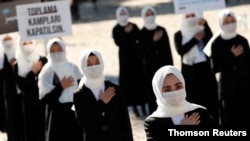While more findings are surfacing about the destruction of mosques and shrines in the Xinjiang Muslim region of China, some Uighurs tell VOA that Chinese authorities have banned the Islamic marriage vow known as nikah in wedding ceremonies, a claim corroborated by an article previously written by a Chinese official.
A Uighur couple in their late 20s, who spoke to VOA on the condition of anonymity for fear of retribution, had to omit nikah during their wedding ceremony after lawfully registering and obtaining a marriage certificate issued by the local government in China’s northwest region of Xinjiang last fall.
Nikah is a formal Islamic marriage vow. It is considered integral to a religiously valid Islamic marriage and outlines the rights and responsibilities of the groom and the bride. Verses from the Quran are read, and a religious scholar must be involved. The majority of Uighurs follow the Sunni denomination of Islam, and Islamic religious elements such as nikah play a significant role in their traditional marriage.
“Even though we are granted religious freedom on paper [in the Chinese constitution], we were already fully aware that attempting to have the ritual would put us on the list [for detention],” the couple told VOA.
“Having that [nikah vow] in weddings nowadays here [in Xinjiang] equals to being a religious extremist, which would land anyone involved in the ritual in reeducation or even a long prison sentence,” they said.
Official affirmation
In an article posted in 2018 on the Chinese social media platform WeChat, Behtiyar Ablimit, a committee member of the ruling Chinese Communist Party (CCP) in Poskam county in southern Xinjiang, attested to the government’s proscription of nikah, while contradicting Chinese official statements, which often emphasize that the religious rights of Uighurs are “fully respected” in Xinjiang.
The article details the return of “four activities” to the secular world.
The “four activities” referred to are wedding, funeral, naming and circumcision ceremonies.
“With the return of the ‘four activities’ to the secular world, not only [Chinese Communist] Party members and public officials but also a lot of masses spontaneously reject the interference of religion on the ‘four activities,’ and they do not invite religious figures to their weddings, funerals, naming and circumcision ceremonies,” the article said.
According to Tim Grose, a professor of China studies at Rose-Hulman Institute of Technology in Terre Haute, Indiana, the CCP has been restricting the religious elements of Uighur traditional ceremonies since the 2010s.
“By monitoring and eliminating the religious elements of these rituals, the CCP can take another step in their efforts to secularize and therefore Sinicize the Uighurs,” Grose said, adding that the “four activities” provided Uighurs an opportunity to express their distinct ethno-religious identity.
Nury Turkel, a commissioner on the U.S. Commission on International Religious Freedom (USCIRF), told VOA his organization was deeply concerned about the Chinese government's ban on traditional Uighur marriage ceremonies.
“As USCIRF noted in its 2020 annual report, these restrictions are part of the government's campaign to forcibly assimilate Uighur Muslims into Han Chinese culture,” Turkel said, adding that USCIRF monitors such violations of religious freedom and informs the U.S. president, Congress and the rest of the U.S. government through its reporting.
Destruction of religious sites
The Australian Strategic Policy Institute (ASPI) last week released a report about the destruction of mosques and Islamic sites in Xinjiang Uighur Autonomous Region (XUAR).
The report, which used satellite imagery, estimated that approximately 16,000 mosques in Xinjiang (65% of the total) have been destroyed or damaged as a result of Chinese government policies.
“An estimated 8,500 have been demolished outright, and for the most part, the land on which those razed mosques once sat remains vacant. A further 30% of important Islamic sacred sites (shrines, cemeteries and pilgrimage routes, including many protected under Chinese law) have been demolished across Xinjiang, mostly since 2017, and an additional 28% have been damaged or altered in some way,” the report said.
Chinese Foreign Ministry spokesperson Wang Wenbin called the ASPI’s report “nothing but slanderous rumors” against China, adding that “such a shoddy report has no credibility at all.”
Rian Thum, a historian of Islam in China at the University of Nottingham, told VOA that the CCP sees threats to its control through racist and Islamophobic lenses.
“Expressions of distinctive culture are treated as a threat, even more so when that culture is connected to Islam,” Thum said.
Defending policies in Xinjiang
When faced with international backlash over the persecution of Uighurs and other Muslim minorities in Xinjiang in recent years, including the detention of nearly 1.8 million in internment camps, Chinese authorities reject the accusations, saying it is running a "transformation-through-education centers" campaign in Xinjiang where it faces “threat” from extremism and terrorism.
Last week, Chinese President Xi Jinping said his government’s policy in Xinjiang has achieved great results, while hailing the CCP’s “unprecedented achievements” since 2014.
“Practice has proved that the party’s strategy of governing Xinjiang in the new era is completely correct and must be adhered to for a long time,” Xi said during a high-level CCP meeting on Xinjiang policy in Beijing, according to Xinhua, a Chinese state-run news agency.
Joanne Smith Finley, an expert on Uighur studies at Newcastle University, said the Chinese state has associated all forms of Uighurs’ Islamic practice, however peaceful and ordinary, with religious extremism.
“The Chinese state under Xi Jinping has become increasingly Han-majoritarian and Han assimilationist since 2012. It has reconstructed the Uighur body, mind, language, religion and culture as an existential and biological threat to the Chinese nation,” she told VOA.




